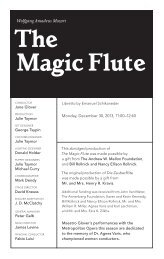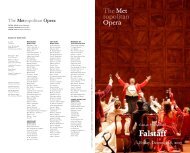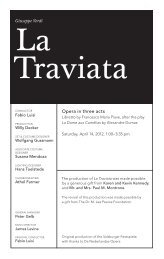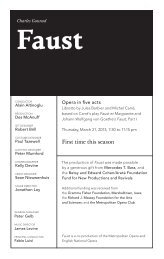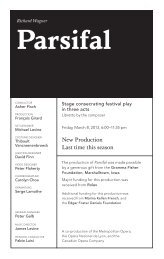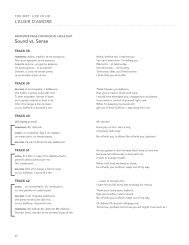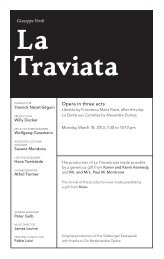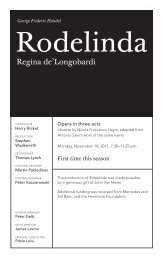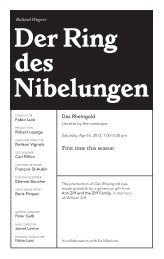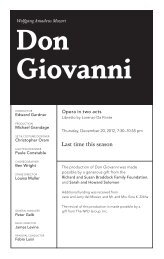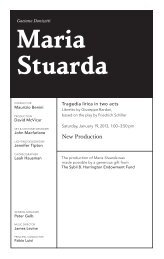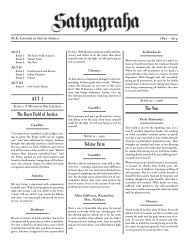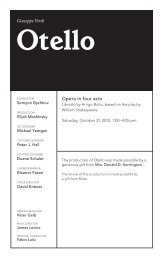January 5: Les Troyens - Metropolitan Opera
January 5: Les Troyens - Metropolitan Opera
January 5: Les Troyens - Metropolitan Opera
Create successful ePaper yourself
Turn your PDF publications into a flip-book with our unique Google optimized e-Paper software.
Hector Berlioz<br />
<strong>Les</strong><br />
<strong>Troyens</strong><br />
CONDUCTOR<br />
Fabio Luisi<br />
PRODUCTION<br />
Francesca Zambello<br />
SET DESIGNER<br />
Maria Bjørnson<br />
COSTUME DESIGNER<br />
Anita Yavich<br />
LIGHTING DESIGNER<br />
James F. Ingalls<br />
CHOREOGRAPHER<br />
Doug Varone<br />
GENERAL MANAGER<br />
Peter Gelb<br />
MUSIC DIRECTOR<br />
James Levine<br />
PRINCIPAL CONDUCTOR<br />
Fabio Luisi<br />
<strong>Opera</strong> in five acts<br />
Libretto by the composer, based on Virgil’s Aeneid<br />
Saturday, <strong>January</strong> 5, 2013, 12:00–5:00 pm<br />
Last time this season<br />
The production of <strong>Les</strong> <strong>Troyens</strong> was made<br />
possible by a generous gift from the Estate of<br />
Francis Goelet, Mr. and Mrs. Ezra K. Zilkha,<br />
Mercedes and Sid Bass, the Edgar Foster<br />
Daniels Foundation, Mr. and Mrs. William R.<br />
Miller, and Mr. and Mrs. Paul M. Montrone<br />
Additional funding was received from<br />
The Annenberg Foundation, Gilbert S. Kahn and<br />
John J. Noffo Kahn, and the National Endowment<br />
for the Arts
This performance<br />
is being broadcast<br />
live over The<br />
Toll Brothers–<br />
<strong>Metropolitan</strong><br />
<strong>Opera</strong> International<br />
Radio Network,<br />
sponsored by<br />
Toll Brothers,<br />
America’s luxury<br />
homebuilder ® , with<br />
generous long-term<br />
support from<br />
The Annenberg<br />
Foundation, The<br />
Neubauer Family<br />
Foundation, the<br />
Vincent A. Stabile<br />
Endowment for<br />
Broadcast Media,<br />
and contributions<br />
from listeners<br />
worldwide.<br />
This performance is<br />
also being broadcast<br />
live on <strong>Metropolitan</strong><br />
<strong>Opera</strong> Radio on<br />
SiriusXM channel 74.<br />
2012–13 Season<br />
The 44th <strong>Metropolitan</strong> <strong>Opera</strong> performance of<br />
Hector Berlioz’s<br />
<strong>Les</strong> <strong>Troyens</strong><br />
Conductor<br />
Fabio Luisi<br />
PART I: LA PRISE DE TROIE<br />
in order of vocal appearance<br />
Panthus, Trojan priest<br />
and friend of Aeneas<br />
Richard Bernstein<br />
Cassandra, Trojan prophetess,<br />
daughter of Priam<br />
Deborah Voigt<br />
Coroebus, Asian prince,<br />
engaged to Cassandra<br />
Dwayne Croft*<br />
Aeneas, Trojan hero<br />
Bryan Hymel<br />
Helenus, Trojan priest,<br />
son of Priam<br />
Eduardo Valdes<br />
Ascanius, son of Aeneas<br />
Julie Boulianne<br />
Saturday, <strong>January</strong> 5, 2013, 12:00–5:00 pm<br />
Hecuba, Queen of Troy<br />
Theodora Hanslowe<br />
Priam, King of Troy<br />
Julien Robbins<br />
Ghost of Hector,<br />
a Trojan hero<br />
David Crawford<br />
Andromache,<br />
widow of Hector<br />
Jacqueline Antaramian<br />
Astyanax, son of<br />
Andromache and Hector<br />
Connell C. Rapavy
* Graduate of the<br />
Lindemann Young Artist<br />
Development Program<br />
PART II: LES TROYENS À CARTHAGE<br />
in order of vocal appearance<br />
Dido, Queen of Carthage<br />
Susan Graham<br />
Anna, sister of Dido<br />
Karen Cargill<br />
Iopas, poet at Dido’s court<br />
Eric Cutler*<br />
Ascanius, son of Aeneas<br />
Julie Boulianne<br />
Panthus, Trojan priest<br />
and friend of Aeneas<br />
Richard Bernstein<br />
Narbal, Dido’s minister<br />
Kwangchul Youn<br />
Aeneas, leader of the<br />
Trojan expedition<br />
Bryan Hymel<br />
The god Mercury<br />
Kwangchul Youn<br />
Hylas, a Trojan sailor<br />
Paul Appleby*<br />
Saturday, <strong>January</strong> 5, 2013, 12:00–5:00 pm<br />
First Trojan Soldier<br />
Paul Corona<br />
Second Trojan Soldier<br />
James Courtney<br />
Ghost of Priam<br />
Julien Robbins<br />
Ghost of Coroebus<br />
Dwayne Croft<br />
Ghost of Cassandra<br />
Deborah Voight<br />
Ghost of Hector<br />
David Crawford<br />
IN THE DANCE<br />
Laocoön<br />
Alex Springer<br />
Royal Hunt Couple<br />
Julia Burrer<br />
Andrew Robinson<br />
Dido’s Court Duet<br />
Christine McMillan<br />
Eric Otto
A scene from Berlioz’s<br />
<strong>Les</strong> <strong>Troyens</strong><br />
Yamaha is the official piano<br />
of the <strong>Metropolitan</strong> <strong>Opera</strong>.<br />
Latecomers will not be<br />
admitted during the<br />
performance.<br />
Visit metopera.org<br />
This afternoon’s performance is being transmitted<br />
live in high definition to movie theaters worldwide.<br />
The Met: Live in HD series is generously supported by its<br />
founding sponsor, the Neubauer Family Foundation.<br />
Bloomberg is the global corporate sponsor of The Met: Live in HD.<br />
Chorus Master Donald Palumbo<br />
Assistant to the Set Designer Adrian Linford<br />
Assistant to the Costume Designer Lora LaVon<br />
Musical Preparation John Keenan, Denise Massé, Carrie-Ann Matheson,<br />
Jonathan Kelly, Natalia Katyukova, and Alexander Bülow<br />
Assistant Stage Directors Sara Erde, Gregory Keller, and Peter McClintock<br />
Stage Band Conductor Gregory Buchalter<br />
Prompter Carrie-Ann Matheson<br />
Met Titles Christopher Bergen<br />
Scenery, properties, and electrical props constructed and painted in<br />
<strong>Metropolitan</strong> <strong>Opera</strong> Shops<br />
Costumes executed by <strong>Metropolitan</strong> <strong>Opera</strong> Costume Department<br />
Wigs executed by <strong>Metropolitan</strong> <strong>Opera</strong> Wig Department<br />
<strong>Les</strong> <strong>Troyens</strong> is performed in the critical edition (New Berlioz Edition)<br />
edited by Hugh Macdonald by arrangement with European American<br />
Music Distributors Company, sole U.S. and Canadian agent for<br />
Bärenreiter-Verlag, publisher and copyright owner.<br />
This performance is made possible in part by public funds from the New<br />
York State Council on the Arts.<br />
Before the performance begins, please switch off cell phones<br />
and other electronic devices.<br />
This production uses flash effects.<br />
The Met will be recording and simulcasting audio/video footage in<br />
the opera house today. If you do not wish for us to use your image,<br />
please tell a Met staff member.<br />
Met Titles<br />
To activate, press the red button to the right of the screen in front of your<br />
seat and follow the instructions provided. To turn off the display, press<br />
the red button once again. If you have questions please ask an usher at<br />
intermission.<br />
Cory Weaver/<strong>Metropolitan</strong> <strong>Opera</strong>
Synopsis<br />
PART I<br />
Acts I and II In and around the Walls of Troy<br />
Intermission (aT APPROXIMATELY 1:30 PM)<br />
PART II<br />
Acts III and IV Dido’s Court<br />
Intermission (aT APPROXIMATELY 3:40 PM)<br />
Act V The Trojan encampment at the harbor<br />
Act I<br />
After ten years of siege, the Greeks have departed from Troy, leaving behind<br />
a giant wooden horse as an offering to Pallas Athena. Only the prophetess<br />
Cassandra, daughter of the Trojan king Priam, wonders about the significance of<br />
their enemies’ disappearance. In a vision, she has seen her dead brother Hector’s<br />
ghost walking the ramparts. She has tried to warn her father of impending<br />
disaster and now urges her fiancé, Coroebus, to flee the city, but neither man will<br />
listen to her. When Coroebus begs her to join the peace celebrations, she tells<br />
him that she foresees death for both of them.<br />
The Trojans offer thanks to the gods. Hector’s widow Andromache brings her young<br />
son, the heir to the throne, before King Priam and Queen Hecuba. The warrior<br />
Aeneas arrives and reports that the priest Laocoön is dead. Suspecting the wooden<br />
horse to be some kind of a trick, Laocoön had thrown his spear at it and urged the<br />
crowd to set fire to it, when two giant sea serpents appeared and devoured him and<br />
his two sons. Priam and Aeneas order the horse to be brought into the city to beg<br />
pardon of Athena. Cassandra realizes that this will be the end of Troy.<br />
Act II<br />
Aeneas is visited by the ghost of Hector, who tells him to escape the city. His<br />
destiny, he says, is to found a new empire that someday will rule the world. As<br />
the ghost disappears, Aeneas’s friend Panthus runs in with news that the Greek<br />
soldiers who emerged from the horse are destroying the city. Aeneas rushes off<br />
to lead the defense.<br />
The Trojan women pray for deliverance from the invaders. Cassandra prophesizes<br />
that Aeneas and some of the Trojans will escape to Italy to build a city—a new Troy.<br />
Coroebus has fallen, and Cassandra prepares for her own death. She asks the women<br />
if they will submit to rape and enslavement. When Greek soldiers enter, the women<br />
collectively commit suicide. Aeneas and his men escape with the treasures of Troy.<br />
Visit metopera.org<br />
31
Synopsis CONTINUED<br />
32<br />
Act III<br />
Carthage, North Africa. The people greet their queen, Dido. In the seven years<br />
since they fled their native Tyre following the murder of Dido’s husband, they have<br />
built a flourishing new kingdom. Dido’s sister Anna suggests that Carthage needs a<br />
king and assures her sister that she will love again. Visitors are announced who have<br />
narrowly escaped shipwreck in a recent storm—they are the remaining survivors of<br />
the Trojan army, with Aeneas among them. Dido welcomes them. When news arrives<br />
that the Numidian ruler, Iarbas, is about to attack Carthage, Aeneas identifies himself<br />
and offers to fight alongside the Carthaginians. Dido accepts, and Aeneas rallies the<br />
united forces of Carthage and Troy, entrusting his son, Ascanius, to the queen’s care.<br />
Act IV<br />
Aeneas has returned victorious to Carthage. During a royal hunt, he and Dido<br />
seek shelter from a storm in a cave. They discover their love for each other.<br />
It is several months later. Narbal, the queen’s adviser, is worried that since Dido<br />
fell in love with Aeneas, she has been neglecting her duties. He fears that in<br />
welcoming the Trojan strangers, Carthage has invited its own doom. Dido enters<br />
with Aeneas and her court to watch an entertainment of singing and dancing.<br />
She asks Aeneas to tell her more about Troy’s last days. When he talks about<br />
Andromache, Hector’s widow, who married Pyrrhus, one of the enemy, Dido sees<br />
a parallel to her own situation. Alone, she and Aeneas again proclaim their love,<br />
as the god Mercury reminds Aeneas of his duty and destination—Italy.<br />
Act V<br />
At night in the Trojan camp by the harbor, a young sailor sings a homesick ballad.<br />
Panthus and the Trojan captains are worried about omens and apparitions that<br />
remind them of their failure to move on. Aeneas enters, torn between his love<br />
for Dido and his duty to leave Carthage. He makes up his mind to see the queen<br />
one last time. But when the ghosts of Priam, Hector, Coroebus, and Cassandra<br />
appear, urging him to leave, he orders his men to set sail before sunrise. Dido<br />
appears. Aeneas swears that he loves her but must leave her. She curses him. As<br />
dawn breaks, the queen asks her sister to persuade Aeneas to stay, but the Trojan<br />
ships are already on their way out to sea. Furious, Dido orders a pyre built to burn<br />
his gifts and remembrances of their love. Now resolved to end her life, she bids<br />
farewell to Carthage and everything she held dear.<br />
The pyre has been set up. Priests pray for Dido, who predicts that her fate will be<br />
remembered: a future Carthaginian general, Hannibal, will avenge her against<br />
Italy one day. Then she stabs herself with Aeneas’s sword. Dying, she has a vision<br />
of Carthage destroyed by eternal Rome. As the Roman Capitol is seen like an<br />
apparition in the distance, the Carthaginians curse Aeneas and his descendants.
In Focus<br />
Hector Berlioz<br />
<strong>Les</strong> <strong>Troyens</strong><br />
Premiere: Paris, Théâtre Lyrique, 1863 (Acts III–V, as <strong>Les</strong> <strong>Troyens</strong> à Carthage)<br />
Karlsruhe, Court Theater, 1890 (complete)<br />
A five-act grand opera of magnificent sweep, <strong>Les</strong> <strong>Troyens</strong> is the culmination of the<br />
extraordinary career of Hector Berlioz (according to the composer himself). The<br />
work includes large-scale choruses, ballets, complex ensembles, and gripping and<br />
insightful vocal solos, combined with a unique use of the orchestra, highlighted<br />
in a thrilling symphonic interlude. The subject is a series of key incidents from<br />
Virgil’s epic Aeneid, the tale of Aeneas, a Prince of Troy and witness to the fall of<br />
that legendary city to the Greeks. Ordered by the gods to found a new Troy in<br />
Italy (which would become the city of Rome), Aeneas on his travels encounters<br />
and falls in love with Dido, the Queen of Carthage, before reluctantly completing<br />
his divinely ordained mission. Many ancient tales are set amid the aftermath<br />
of the Trojan War, sharing as their background the rise of a new order out of<br />
the downfall of the old. The Aeneid is one of the supreme foundation myths of<br />
European civilization, enshrining Rome as the culmination of human achievement<br />
in such powerful terms that its imagery remains potent and pervasive to this<br />
day. Berlioz’s passionate devotion to the Aeneid was more than abstract: a<br />
self-conscious visionary seeking new directions in art and music, his devotion to<br />
the epic was deeply personal as well.<br />
The Creators<br />
Hector Berlioz (1803–1869), a French composer, conductor, music critic, and<br />
essayist, was a major figure of 19th-century musical life. More celebrated in his<br />
lifetime as a conductor and writer, his uninhibited reviews and articles make for<br />
lively reading even today, and his Treatise on Instrumentation (1844) has had<br />
a profound impact on later composers. His musical works were extravagantly<br />
praised and even more intensely vilified in his day, and it is only within the last few<br />
generations that his stature as a groundbreaking composer has been recognized<br />
and that several of his operas have entered the repertory.<br />
The Setting<br />
The first part of the opera is set around and inside the walled city of Troy, located<br />
in the modern nation of Turkey, at the time of its conquest at the end of the Trojan<br />
War, approximately 3,000 years ago. The second part takes place several months<br />
later, in and around the North African city of Carthage, whose ruins are now found<br />
in the state of Tunisia.<br />
Visit metopera.org<br />
33
In Focus CONTINUED<br />
The Music<br />
The score of <strong>Les</strong> <strong>Troyens</strong> is notable for its dramatic originality, the diversity of its forms,<br />
its creative use of the orchestra, and its sheer beauty. The grand and the monumental<br />
alternate with moments of extreme austerity. Berlioz also developed convincing<br />
sounds to illustrate the imaginary: stopped horns and tremulous strings herald the<br />
appearance of ghosts; ringing percussion, woodwinds, and harps evoke ritual and<br />
quasi-Asiatic antiquity throughout. The extraordinary vocal solos never fail to reveal<br />
details of character or situation: the jagged quality of Cassandra’s “Malheureux roi!”<br />
in Act I is appropriate to someone who is not understood by the common person;<br />
her lover Coroebus’s subsequent melody is both consoling and more typically<br />
conventional. Aeneas’s great narrative in Act V encompasses all the aspects of his<br />
character, from the conflicted to the resolute and heroic, to the melancholic section<br />
as he bids farewell to his beloved. Similarly, Dido’s grand suicide scene encompasses<br />
an arc passing through melancholy and dejection and concluding in a magnificent<br />
operatic rage. The fourth act is one of opera’s great monuments to love. The orchestral<br />
Royal Hunt and Storm that opens it depicts Dido and Aeneas consummating their<br />
love; the music is simultaneously mythic and erotic. The act continues with a beautiful<br />
pastoral song for the secondary tenor and an equally ravishing quintet that becomes<br />
a septet, before climaxing with an extended love duet. It’s a perfect example of<br />
Berlioz’s gift for suspending tension and delaying the inevitable. This happens again<br />
at the beginning of Act V, when the final, fatal break of Dido and Aeneas hangs in<br />
wait while a sailor sings a wrenchingly sad song recalling his lost homeland. Perhaps<br />
the most notable feature of the <strong>Troyens</strong> score is the relationship of its parts to the<br />
whole. The rousing Trojan March of Act I reappears in a bedraggled minor mode<br />
in Act III, contrasting with the joyful choruses of the Carthaginians in the same act.<br />
National themes are referenced in Act IV’s magnificent love scene, adding complex<br />
dimensions to these characters, which are meant to be understood both as real fleshand-blood<br />
people and as symbols of their respective empires.<br />
<strong>Les</strong> <strong>Troyens</strong> at the Met<br />
The opera premiered at the Met in 1973, in a production directed by Nathaniel Merrill<br />
and conducted by Rafael Kubelik. Jon Vickers was Aeneas and Shirley Verrett sang<br />
both Cassandra and Dido. In subsequent performances that season, Dido was sung<br />
by Christa Ludwig. James Levine conducted the opera for the Opening Night of the<br />
Met’s centennial season in 1983, when the cast included Plácido Domingo as Aeneas,<br />
Tatiana Troyanos as Dido, and Jessye Norman as Cassandra, in her long-awaited Met<br />
debut. Maestro Levine was again on the podium for a 1993 revival featuring Gary<br />
Lakes (Aeneas), Françoise Pollet (Cassandra), Maria Ewing (Dido), Thomas Hampson<br />
(Coroebus), and Susan Graham in the role of Ascanius. The current production<br />
by Francesca Zambello premiered in February 2003, with Levine conducting Ben<br />
Heppner as Aeneas, Deborah Voigt as Cassandra, and Lorraine Hunt Lieberson as<br />
Dido, one of only two complete roles Lieberson sang at the Met.<br />
Visit metopera.org<br />
35
often, construing to my father the fourth book of the Aeneid, did I<br />
feel my heart swell and my voice falter and break!… When I reached<br />
“How<br />
the scene in which Dido expires on the funeral pyre, surrounded by<br />
the gifts and weapons of the perfidious Aeneas… and I had to pronounce the<br />
despairing utterances of the dying queen… my lips trembled and the words<br />
came with difficulty, indistinctly. At last, at the line ‘Quaesivit coelo lucem<br />
ingemuitque reperta,’ at that sublime image—as Dido ‘sought light from heaven<br />
and moaned at finding it’—I was seized with a nervous shuddering and stopped<br />
dead. My father, seeing how confused and embarrassed I was by such emotion,<br />
but pretending not to have noticed anything, rose abruptly and shut the book.<br />
‘That will do, my boy,’ he said. ‘I’m tired.’ I rushed away, out of sight of everybody,<br />
to indulge my Virgilian grief.”<br />
Thus vividly did Hector Berlioz, in his 1854 Memoirs, recall his early readings<br />
of the Latin epic that would inspire his greatest work. (The Memoirs, splendidly<br />
translated by David Cairns, are essential reading for understanding Berlioz, as<br />
is Cairns’s two-volume biography of the composer.) Later in the same book, he<br />
wrote: “For the last three years I have been tormented by the idea for a vast<br />
opera, for which I would write the words and the music… I am resisting the<br />
temptation to carry out this project and shall, I trust, resist to the end. To me the<br />
subject seems magnificent and deeply moving—sure proof that Parisians would<br />
think it flat and tedious.”<br />
Such cynicism was the fruit of bitter experience. <strong>Opera</strong> in Paris under the<br />
bourgeois July monarchy had been dominated by the historical spectacles of<br />
Halévy and Meyerbeer, and the rhinestone glitter of the Second Empire promised<br />
little better. Having for years earned his living as a critic—and a sharp-tongued<br />
one—Berlioz was inevitably unpopular with the operatic establishment, as well<br />
as constitutionally incapable of currying bureaucratic favor. After the failure of<br />
Benvenuto Cellini (composed in 1834–37 for the Opéra, then revised for the<br />
Opéra Comique, where it was played in 1838), he worked half-heartedly at setting<br />
a libretto by the highly acceptable Eugène Scribe, La Nonne Sanglante, eventually<br />
abandoning it—and, apparently, the operatic stage—in 1847.<br />
The subject that haunted Berlioz in 1854 was “a vast opera, on the<br />
Shakespearean plan, based on the second and fourth books of the Aeneid,” and<br />
two years later in Weimar, Liszt’s mistress, Princess Carolyne of Sayn-Wittgenstein,<br />
pressed him to undertake it: “Your passion for Shakespeare combined with<br />
this love of classical antiquity would be sure to produce something new and<br />
splendid.” Berlioz made objections, but “on my return to Paris I set to work to<br />
write the verses for my lyric poem.” The distractions of earning a living were<br />
formidable: “I rush about Paris from morning till night. And always these infernal<br />
articles to write—recitals by beginners of both sexes, revivals of antiquated<br />
operas, first performances of antiquated operas…” By July 1856 the poem was<br />
36<br />
Program Note
complete, and composition had already begun in May; <strong>Les</strong> <strong>Troyens</strong> had assumed<br />
such urgency in Berlioz’s life that the entire mammoth work, orchestration and all,<br />
was completed by April 7, 1858. “Whatever fate awaits it, I now feel nothing but<br />
happiness at having completed it.”<br />
But Virgil was not Berlioz’s only inspiration, as both he and the Princess<br />
Sayn-Wittgenstein recognized. His first encounters with Shakespeare, at the<br />
hands of an English theatrical troupe visiting Paris in 1827, had been inextricably<br />
intermingled with his passion for the actress Harriet Smithson, whom he later<br />
courted and married—unhappily, alas. To such French Romantics as Berlioz and<br />
Victor Hugo, Shakespeare seemed almost a modern author, whom they read<br />
in contemporary French translations. Regarding him against the background<br />
of France’s more formal and classical traditions of tragedy, the Romantics<br />
celebrated him for his mixing of genres, his fluidity of time, place, and structure,<br />
and his verbal directness. And Berlioz’s grand opera “on the Shakespearean<br />
plan” shows all those traits.<br />
Drawing on his lifelong intimate knowledge of Virgil’s epic, he culled ideas<br />
and phrases and episodes from throughout its course, often hewing closely to the<br />
original Latin text, and arranged them in a dramaturgy that flows convincingly from<br />
ceremony to intimacy to humor to passion and, inevitably, to tragedy. (However,<br />
the character of Cassandra, who dominates the episodes in Troy, is virtually his<br />
own invention, based on the merest hint in Virgil.) Shakespeare’s own words find<br />
their way into the Act IV love duet for Dido and Aeneas, a transmutation of the<br />
love scene between Lorenzo and Jessica in The Merchant of Venice (“In such a<br />
night stood Dido with a willow in her hand…”) This “Shakespearization” of Virgil<br />
is matched by a “Berliozation” of Gluck’s classicism, imbuing its musical breadth<br />
and emotional power with Berlioz’s own explosive romanticism. And as far as the<br />
mass effects beloved of grand opera were concerned, the composer’s command<br />
of large musical forces was already proven by his Requiem and Te Deum.<br />
The opera is filled, too, with a love of Italy—her landscapes, people, and art—<br />
that Berlioz acquired during his 15 months of residence there after winning the<br />
Prix de Rome in 1830. The famous sequence of quintet, septet with chorus, and<br />
love duet that ends the fourth act is suffused with the radiance of a Claude Lorrain<br />
sunset—a poignant valedictory to the great French classical tradition descended<br />
through Poussin, Watteau, and David, and in music through Lully, Rameau, Gluck,<br />
Cherubini, and Spontini. With its spare and concentrated style, deployed over a<br />
vast and varied canvas, <strong>Les</strong> <strong>Troyens</strong> represents a unique, highly personal blend of<br />
Gluckian tragédie lyrique and the panoply of 19th-century grand opera.<br />
Whatever grim fate Berlioz anticipated for his work, the reality proved to be<br />
worse. In 1861, the notorious fiasco of Wagner’s Tannhäuser seemed to improve<br />
the prospects of <strong>Les</strong> <strong>Troyens</strong> at the Opéra, but after keeping Berlioz dangling<br />
for three years the management finally turned it down, and he accepted an offer<br />
Visit metopera.org<br />
37
38<br />
Program Note CONTINUED<br />
from the inadequate Théâtre Lyrique. Chief among numerous indignities was<br />
the demand that he divide his opera into two parts, of which only the second,<br />
comprising the last three acts and christened <strong>Les</strong> <strong>Troyens</strong> à Carthage, was<br />
eventually performed, on November 4, 1863. The reception was not unfavorable—<br />
enough to sustain 21 performances, in fact—but the cumulative mutilations<br />
practiced during the run outraged the composer, especially as they were also<br />
incorporated into the printed score. (One unexpected consolation emerged:<br />
the royalties were sufficient to let him resign from the treadmill of journalism).<br />
The first two acts, known as La Prise de Troie in the two-part version, were not<br />
performed in Berlioz’ lifetime: “Oh my noble Cassandra, my heroic virgin, I<br />
must then resign myself: I shall never hear you—and I am like Coroebus, insano<br />
Cassandrae incensus amore.” Only in 1890, two decades after the composer’s<br />
death, an integral version, sung in German, was presented at Karlsruhe under the<br />
direction of Felix Mottl.<br />
—David Hamilton
The Cast<br />
Fabio Luisi<br />
conductor (genoa, italy)<br />
this season Un Ballo in Maschera, <strong>Les</strong> <strong>Troyens</strong>, Aida, and Wagner’s Ring cycle at the<br />
Met; Don Carlo at La Scala; Jen˚ufa, Tosca, La Bohème, Rigoletto, Der Rosenkavalier,<br />
and Bellini’s La Straniera at the Zurich <strong>Opera</strong>; and concerts with the MET Orchestra at<br />
Carnegie Hall, the Vienna Symphony, and Philharmonia Zürich.<br />
met appearances Don Giovanni, Manon, La Traviata, Le Nozze di Figaro, Elektra, Hansel<br />
and Gretel, Tosca, Lulu, Simon Boccanegra, Die Ägyptische Helena, Turandot, Ariadne<br />
auf Naxos, Rigoletto, Don Carlo (debut, 2005), and the Ring cycle.<br />
career highlights He is principal conductor of the Met, chief conductor of the Vienna<br />
Symphony, and general music director of the Zurich <strong>Opera</strong>. He made his La Scala debut<br />
last season with Manon, his Salzburg Festival debut in 2003 leading Strauss’s Die Liebe der<br />
Danae (returning the following season for Die Ägyptische Helena), and his American debut<br />
with the Lyric <strong>Opera</strong> of Chicago leading Rigoletto. He also appears regularly with the Vienna<br />
State <strong>Opera</strong>, Munich’s Bavarian State <strong>Opera</strong>, and Berlin’s Deutsche Oper and Staatsoper.<br />
Karen Cargill<br />
mezzo-soprano (arbroath, scotland)<br />
this season Anna in <strong>Les</strong> <strong>Troyens</strong> and Waltraute in Götterdämmerung at the Met, the First<br />
Norn in Götterdämmerung for her debut at Covent Garden, Schoenberg’s Gurrelieder<br />
with the Berlin Philharmonic, and concert appearances with the Rotterdam Philharmonic,<br />
Boston Symphony Orchestra, and Philadelphia Orchestra.<br />
met appearances Waltraute (debut, 2012).<br />
career highlights Recent performances include Waltraute at the Deutsche Oper Berlin,<br />
Rosina in Il Barbiere di Siviglia and Isabella in L’Italiana in Algeri with Scottish <strong>Opera</strong>, and<br />
Suzuki in Madama Butterfly with English National <strong>Opera</strong>. She appears regularly in concerts<br />
with the BBC Symphony and London Philharmonic Orchestras, Hallé Philharmonic, Royal<br />
Liverpool Philharmonic, London Symphony Orchestra, and Scottish Chamber Orchestra.<br />
She has also appeared at the Tanglewood Festival with the London Symphony Orchestra,<br />
the Edinburgh Festival with the BBC Scottish Symphony Orchestra, and in recital at<br />
London’s Wigmore Hall.<br />
Visit metopera.org<br />
39
40<br />
The Cast CONTINUED<br />
Susan Graham<br />
mezzo-soprano (roswell, new mexico)<br />
this season Dido in <strong>Les</strong> <strong>Troyens</strong> at the Met, a U.S. recital tour with Renée Fleming and<br />
Bradley Moore, Tina in Argento’s The Aspern Papers for her debut with the Dallas<br />
<strong>Opera</strong>, and the title role of Offenbach’s La Grande-Duchesse de Gérolstein with the<br />
Santa Fe <strong>Opera</strong>.<br />
met appearances More than 100 performances of 15 roles including two world premieres<br />
(Jordan Baker in Harbison’s The Great Gatsby and Sondra Finchley in Picker’s An American<br />
Tragedy) since her company debut in 1991as the Second Lady in Die Zauberflöte.<br />
career highlights The title role of Gluck’s Iphigénie en Tauride at the Salzburg Festival and<br />
in London, Chicago, San Francisco, and Paris, the title role of Handel’s Xerxes with the<br />
Houston Grand <strong>Opera</strong>, Sister Helen Prejean in the world premiere of Heggie’s Dead Man<br />
Walking and the title role of Handel’s Ariodante with the San Francisco <strong>Opera</strong>, Cecilio in<br />
Lucio Silla with the Santa Fe <strong>Opera</strong>, and the title role of Monteverdi’s L’Incoronazione di<br />
Poppea and Hanna Glawari in The Merry Widow with the Los Angeles <strong>Opera</strong>.<br />
Deborah Voigt<br />
soprano (chicago, illinois)<br />
this season Cassandra in <strong>Les</strong> <strong>Troyens</strong> and Brünnhilde in Wagner’s Ring cycle at the Met<br />
and Minnie in La Fanciulla del West in Liège.<br />
met appearances Title roles of La Gioconda, Die Ägyptische Helena, Ariadne auf Naxos,<br />
Tosca, and Aida, Minnie, Chrysothemis in Elektra, Senta in Der Fliegende Holländer, Isolde<br />
in Tristan und Isolde, Amelia in Un Ballo in Maschera (debut, 1991), Elsa in Lohengrin,<br />
Leonora in Il Trovatore and La Forza del Destino, Elisabeth in Tannhäuser, and the Empress<br />
in Die Frau ohne Schatten.<br />
career highlights Minnie with the San Francisco <strong>Opera</strong> and Lyric <strong>Opera</strong> of Chicago, the<br />
title role of Annie Get Your Gun at the Glimmerglass Festival, Salome at Lyric <strong>Opera</strong><br />
of Chicago, her first Isolde in Vienna followed by a 23-minute standing ovation, regular<br />
appearances as a host in the Met’s Live in HD series, and President Clinton’s visit to her<br />
Met performances as Aida.
Dwayne Croft<br />
baritone (cooperstown, new york)<br />
this season Ping in Turandot, Escamillo in Carmen, Coroebus in <strong>Les</strong> <strong>Troyens</strong>, Rambaldo<br />
in La Rondine, and Donner in Das Rheingold at the Met, Sharpless in Madama Butterfly<br />
with Pittsburgh <strong>Opera</strong>, and Walt Whitman in the world premiere of Theodore Morrison’s<br />
Oscar at Santa Fe <strong>Opera</strong>.<br />
met appearances More than 450 performances of 33 roles, including Sharpless, Nick<br />
Carraway in the world premiere of John Harbison’s The Great Gatsby, Silvio in Pagliacci,<br />
Marcello in La Bohème, Fiorello (debut, 1990) and Figaro in Il Barbiere di Siviglia, Count<br />
Almaviva in Le Nozze di Figaro, Billy Budd, Pelléas in Pelléas et Mélisande, and Guglielmo<br />
in Così fan tutte.<br />
career highlights Recent performances include Dr. Malatesta in Don Pasquale with<br />
Washington National <strong>Opera</strong>, Jack Rance in La Fanciulla del West with the Finnish National<br />
<strong>Opera</strong>, and Harold Hill in Meredith Willson’s The Music Man at Glimmerglass <strong>Opera</strong>. He<br />
has also sung Germont in La Traviata with the San Francisco <strong>Opera</strong>, Marcello with the Dallas<br />
<strong>Opera</strong>, Escamillo with the Cincinnati <strong>Opera</strong>, Count Almaviva and Figaro with the Vienna<br />
State <strong>Opera</strong>, Eugene Onegin and Sharpless at the Paris <strong>Opera</strong>, and Jaufré Rudel in the<br />
world premiere of Saariaho’s L’Amour de Loin and Count Almaviva at the Salzburg Festival.<br />
Eric Cutler<br />
tenor (adel, iowa)<br />
this season Iopas in <strong>Les</strong> <strong>Troyens</strong> at the Met, Leicester in Maria Stuarda with the Deutsche<br />
Staatsoper Berlin, and des Grieux in Manon <strong>Les</strong>caut in concert with the Philharmonie<br />
Luxembourg.<br />
met appearances Italian Singer in Der Rosenkavalier, Tamino in Die Zauberflöte, Arturo in<br />
I Puritani, Léopold in La Juive, Andres in Wozzeck, First Prisoner in Fidelio (debut, 2000),<br />
Megäros/Student from Wittenberg in Doktor Faust, First Knight in Parsifal, Scaramuccio in<br />
Ariadne auf Naxos, and Vogelgesang in Die Meistersinger von Nürnberg.<br />
career highlights He recently sang Raoul de Nagis in Meyerbeer’s <strong>Les</strong> Huguenots in Brussels<br />
and Madrid; other performances include Roméo in Roméo et Juliette with <strong>Opera</strong> Australia<br />
and at Venice’s La Fenice, Iopas with the Paris <strong>Opera</strong> and in Valencia, Nadir in <strong>Les</strong> Pêcheurs<br />
de Perles with Lyric <strong>Opera</strong> of Chicago, Ernesto in Don Pasquale at Covent Garden, Tamino<br />
at the Edinburgh Festival, and the Shepherd in Szymanowski’s v with the Paris <strong>Opera</strong> and<br />
in Brussels. He is a graduate of the Met’s Lindemann Young Artist Development Program.<br />
Visit metopera.org<br />
41
42<br />
The Cast CONTINUED<br />
Bryan Hymel<br />
tenor (new orleans, louisiana)<br />
this season Aeneas in <strong>Les</strong> <strong>Troyens</strong> for his Met debut, Rodolfo in La Bohème for the <strong>Opera</strong><br />
Company of Philadelphia, Robert in Meyerbeer’s Robert le Diable at Covent Garden,<br />
the Prince in Rusalka at Naples’s Teatro San Carlo, and Archangel Michael in Walter<br />
Braunfels’s Jeanne d’Arc for his Salzburg Festival debut.<br />
career highlights Recent performances include Aeneas and the Prince at Covent Garden,<br />
the title role of Faust with Lyric <strong>Opera</strong> Baltimore, and Robert with Salerno’s Teatro<br />
Municipale. He has also sung Don José in Carmen for his 2010 debut at La Scala (and<br />
later at the Bavarian State <strong>Opera</strong>, Canadian <strong>Opera</strong> Company, and Covent Garden),<br />
Faust at the Santa Fe <strong>Opera</strong>, Aeneas with the Netherlands <strong>Opera</strong>, Pinkerton in Madama<br />
Butterfly with English National <strong>Opera</strong> and Canadian <strong>Opera</strong> Company, the Prince at the<br />
Wexford Festival, and Guido in Zemlinsky’s A Florentine Tragedy at the Bard Festival.<br />
Kwangchul Youn<br />
bass (chung ju, south korea)<br />
this season Narbal/Mercury in <strong>Les</strong> <strong>Troyens</strong> at the Met, King Henry in Lohengrin in Dresden,<br />
King Marke in Tristan und Isolde and Ferrando in Il Trovatore with Munich’s Bavarian State<br />
<strong>Opera</strong>, and Gurnemanz in Parsifal with the Vienna State <strong>Opera</strong>.<br />
met appearances Raimondo in Lucia di Lammermoor, the Commendatore in Don Giovanni,<br />
King Marke, Ferrando, Sarastro in Die Zauberflöte (debut, 2004), Ramfis in Aida, Hermann<br />
in Tannhäuser, and the Old Hebrew in Samson et Dalila.<br />
career highlights He has sung Méphistophélès in Faust and King Henry at the Vienna State<br />
<strong>Opera</strong>; King Henry at Covent Garden; King Marke, Gurnemanz, Fasolt in Das Rheingold, and<br />
Hunding in Die Walküre at the Bayreuth Festival; Wurm in Luisa Miller and Padre Guardiano<br />
in La Forza del Destino with the Paris <strong>Opera</strong>; the title role of Attila in Ludwigsburg; and<br />
Fiesco in Simon Boccanegra, King Henry, and Fasolt with the Berlin State <strong>Opera</strong>



